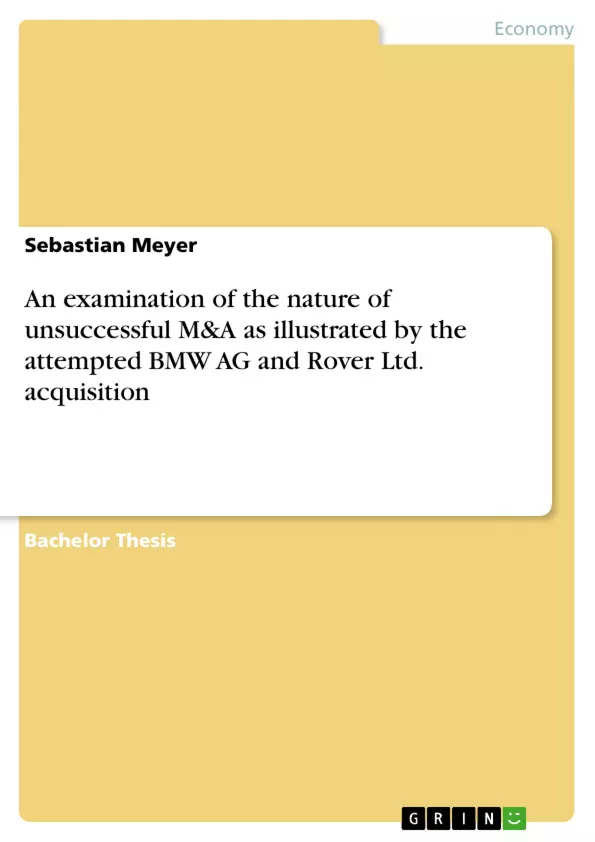It is the aim of the present dissertation to identify and evaluate reasons, which led M&A fail in order to develop a strategy to design such processes more secure. The well-known liaison between BMW and Rover will be used as an example for failing M&A and will accompany this dissertation. After a brief introduction, containing definitions, a historical overview and motives and objectives of M&A this work provides an investigation of both Due Diligence and Post-Merger-Integration. Additionally, the author will clarify the way of data collection, the objectives and the design of his research in a Methodology chapter. Subsequent to the Methodology, a chapter discussing the author’s findings of the Due Diligence and the Post-Merger-Integration concerning BMW and Rover will follow. The last point of the present dissertation is a chapter containing Conclusions and Recommendations in which the author provides his point of view of the BMW and Rover case and his strategy with regard to M&A in general.
Inhaltsverzeichnis (Table of Contents)
- Introduction
- Conceptual formulation
- Definitions of relevant terms
- The Structure of the Dissertation
- Historical background of M&A activities
- Motives and objectives of mergers and acquisitions
- Due Diligence
- Explanation of the term ‘Due Diligence’
- The content of a ‘Due Diligence’
- Market and Commercial Due Diligence
- Cultural Due Diligence
- Human Resource Due Diligence
- Post-Merger-Integration Management
- Definition of the term ‘Post-Merger-Integration Management’
- Strategy of integration
- Aims/objectives of integration and success factors
- Implementation of Post Merger Integration
- Organizational oriented integration
- Personnel oriented integration
- Cultural oriented integration
- Methodology
- Introduction
- Research Design
- Methods
- Limitations
- Discussion of the findings
Zielsetzung und Themenschwerpunkte (Objectives and Key Themes)
The purpose of this dissertation is to examine the reasons behind unsuccessful M&A and develop a strategy to improve the success rate of such processes. The acquisition attempt by BMW AG of Rover Ltd. will be used as a case study to illustrate the challenges and pitfalls of M&A.
- The importance of conducting a comprehensive Due Diligence, including "soft keys" such as cultural and human resource considerations.
- The significance of effective Post-Merger Integration (PMI) management, including its organizational, personnel, and cultural dimensions.
- The impact of cultural differences on the success of international M&A.
- The challenges of implementing an appropriate integration strategy that balances autonomy and strategic interdependence.
- The importance of recognizing the impact of key personnel, especially in the context of a takeover.
Zusammenfassung der Kapitel (Chapter Summaries)
The dissertation begins by defining key terms related to M&A, including "Merger" and "Acquisition." It then provides a historical overview of merger waves and discusses the motives and objectives behind mergers and acquisitions. Chapter 2 focuses on the significance of Due Diligence, exploring its various components, including financial, legal, environmental, market, cultural, and human resource aspects. The chapter analyzes the importance of considering "soft keys" in Due Diligence and provides insights into how these were addressed, or not addressed, in the BMW-Rover case.
Chapter 3 delves into Post-Merger Integration (PMI) Management, outlining its definition, strategies, objectives, and success factors. The dissertation analyzes the four main integration strategies: stand-alone, holding, symbiosis, and absorption. It then examines the approach BMW took in the Rover acquisition, highlighting the challenges of achieving organizational, personnel, and cultural integration. The chapter concludes with an analysis of how the chosen integration strategy contributed to the ultimate failure of the acquisition.
Chapter 4 delves into the methodology used in the dissertation. The chapter outlines the research design, methods, and limitations. It explains the use of both a case study and exploratory, descriptive, and explanatory research strategies to address the complexities of the subject matter. The chapter also highlights the limitations of secondary data, emphasizing the need for more thorough research and analysis on the BMW-Rover case.
The “Discussion of the findings” chapter offers a comprehensive overview of the research findings, analyzing the strengths and weaknesses of BMW’s approach to Due Diligence and PMI in the Rover acquisition. This chapter is critical of BMW’s oversight in various areas, particularly their failure to conduct a thorough Due Diligence, address cultural differences, and effectively manage personnel integration.
Schlüsselwörter (Keywords)
The key terms and concepts explored in this dissertation include mergers and acquisitions (M&A), Due Diligence, Post-Merger Integration (PMI), cultural differences, integration strategies, organizational integration, personnel integration, cultural integration, synergy, market power, diversification, risk reduction, and the case study of BMW AG and Rover Ltd.
Frequently Asked Questions
Why did the BMW acquisition of Rover fail?
The failure was largely due to inadequate Due Diligence regarding "soft keys" like culture and human resources, as well as poor Post-Merger Integration management.
What is "Cultural Due Diligence"?
It is an investigation into the cultural compatibility of two merging companies. In the BMW-Rover case, neglecting this led to significant integration problems.
What are the four main integration strategies in M&A?
The strategies are: Stand-alone (independence), Holding (financial control), Symbiosis (mutual learning), and Absorption (full integration).
How important is personnel integration in a merger?
Extremely important. The loss of key personnel or low employee morale due to cultural clashes can destroy the value of an acquisition, as seen in the BMW-Rover liaison.
What are common motives for Mergers and Acquisitions?
Common motives include achieving synergies, increasing market power, diversification, and risk reduction.
- Quote paper
- B.A. Sebastian Meyer (Author), 2004, An examination of the nature of unsuccessful M&A as illustrated by the attempted BMW AG and Rover Ltd. acquisition, Munich, GRIN Verlag, https://www.grin.com/document/76625



